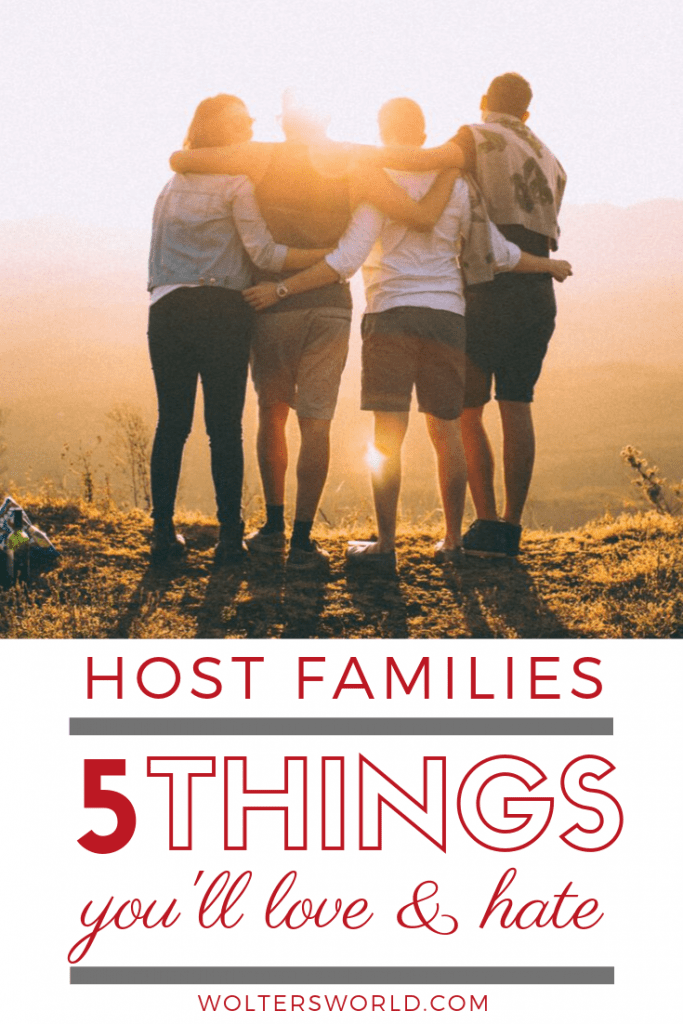Hey there, fellow travelers! Today, we’re talking about living with a host family. Living abroad with a host family is a great experience, but there are also a few downsides to look out for. As you know, here at Wolters World, we like to share both the positives and the negatives of travel, whether it’s short-term or long-term. So these are the five things you’ll love, and the five things you’ll hate about living with a host family.
Hate #1: New Set of Rules
It’s probably taken you your whole life to figure out your own parents: how to get around the rules, which rules you can bend, which parent you can go to, etc, etc. Suddenly, you have a new set of parents to figure out, and new rules to go along with your new living situation. Many study abroad programs have their own rules, in addition to the rules of your new host family. I recommend communicating with your host family ahead of time or right after you arrive to find out what their rules are, especially regarding curfew and overnight guests.
Love #1: Having a New Family
You aren’t just traveling abroad and meeting new friends, your host family is your family forever. I still stay in touch with many of my host families. Having a family around you can help ease your homesickness and help you adjust to your new culture. Not only can they guide you as you learn new customs, but they can also just be there for you when you need them.

Hate #2: Sibling Rivalry
Most host families already have their own children, and there is usually one around your same age. Generally, this is a good thing because you have an automatic friend and they can really help you navigate their country and make new friends at school. However, sometimes it doesn’t work that way and you could find yourself in a sibling rivalry situation. I’ve had both experiences with my new “host” siblings. Some siblings don’t enjoy having an exchange student tag along everywhere, while other siblings will become your best friend for life.
Love #2: Cultural Assistance
I mentioned this briefly in the first point, but there’s no comparison for having a host family when it comes to cultural integration. Since they are like family now, they will be able to pull you aside if they see you making a cultural faux pas, and likewise, you can comfortably ask them how things work in your host country. This helps you get more out of your time abroad and develop a deeper understanding of the culture and customs. If you live with other exchange students rather than a host family, you’ll all be muddling through it together, but you will lack the insider tips that a host family can provide.

Hate #3: Cultural Differences
Many times, your host family doesn’t know much about your culture. You are obviously there to learn and study about their culture, but since they may not know much about your culture, that can cause some friction. For example, when I lived in Finland, my host family would eat a huge lunch and only a small snack for dinner. As an American, I was used to having a big dinner with my family, so I felt like I was always hungry. Being able to communicate openly with your hosts will help alleviate any issues due to cultural differences.
Love #3: Language Learning
In addition to learning about the local customs and culture, having a host family will give your language learning a super boost. You may be studying Spanish and then study abroad in Spain, but textbook Spanish is different from everyday Spanish. The best way to learn a language is immersion, and living with a local family is about as immersed as you can get. When you return back to your home country, your language skills will be years ahead of your classmates.
Seven Tips for Learning a New Language
Hate #4: Big Brother Feeling
Now that you have a host family, you have another mom to get after you about what you are wearing, who you are hanging out with and how late you are staying out. Chances are, you are studying abroad to become more independent. But depending on your host family, you could end up with a very protective host mom. If freedom and independence are super important to you, you might consider other living options, such as an apartment with roommates or a dorm room.

Where to Live When You Study Abroad
Love #4: Eating Real Food
If you study abroad and get an apartment, you’ll be cooking like a college student. Fast food, ramen or pasta made in the microwave are typical student meals around the world. If you live in a dorm, you’ll get dorm cafeteria food. But if you live with a family, you’ll get real home-cooking. If you are homesick, there is nothing like good homestyle comfort food to cheer you up. Now, it may be different comfort food than what you are used to, but it’s likely to be much better than a cafeteria meal at your dorm. Food is a big part of many cultures, so this is just one more way that living with a host family can help you adapt to the local culture.
Hate #5: Conflict Resolution
If you have issues with your host family to the point where you want to move out, it can be difficult. I had a very strict host family in Argentina, to the point where they wouldn’t serve me breakfast if I slept past 8:00 in the morning. When I tried to move out, there was a lot of red tape, as they had already been paid for the semester, so moving out meant I would have to pay again for the rest of the semester. If you do experience any issues, it’s best to document everything and stay in close touch with your sponsors back in the States.
Love #5: Host Family Experiences
Whether it was traveling around the country with my host family or just everyday experiences we had at home, you will go back home at the end of your study abroad program with a lifetime of memories you’ve created with your host family. You’ll spend holidays and birthdays with this family, and if you’re lucky, you’ll stay in touch with them and visit them or invite them to visit you, for years to come.
Despite a few drawbacks here and there, I always got so much more out of my study abroad programs when I had a host family to show me the ropes. If you get the chance to work overseas, I highly recommend you take it. Want more tips on long-term travel? Check out these blog posts:
